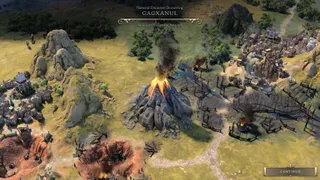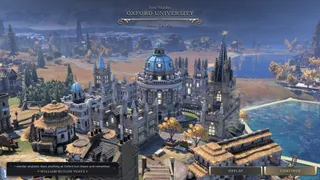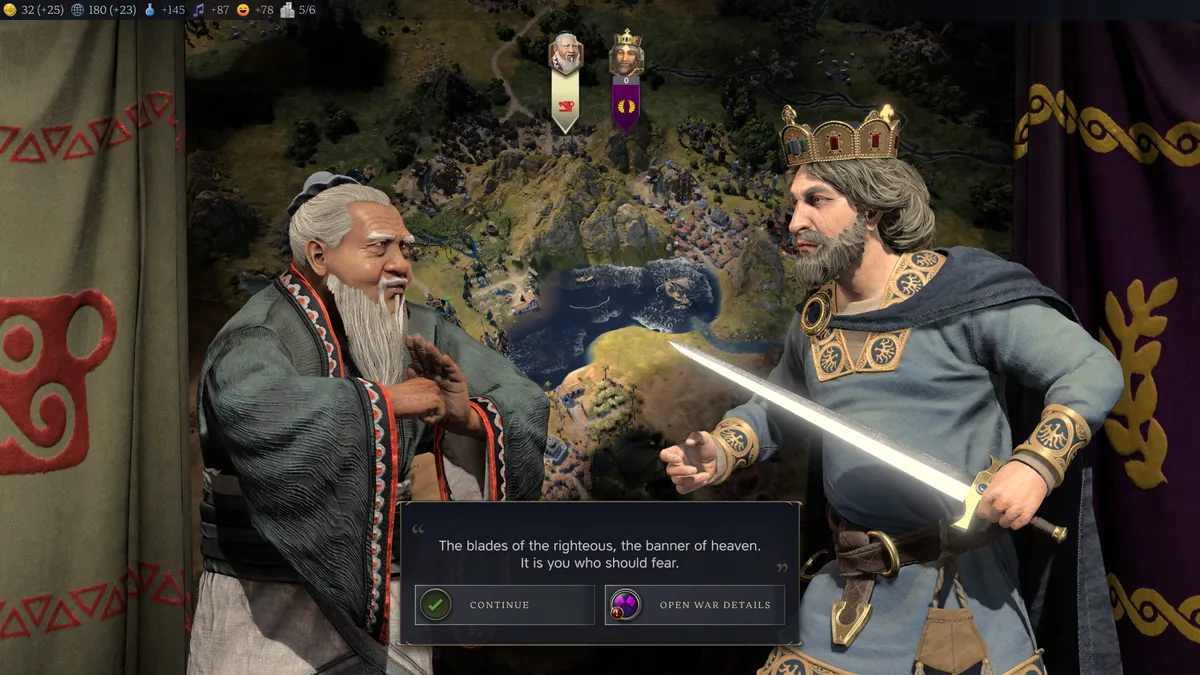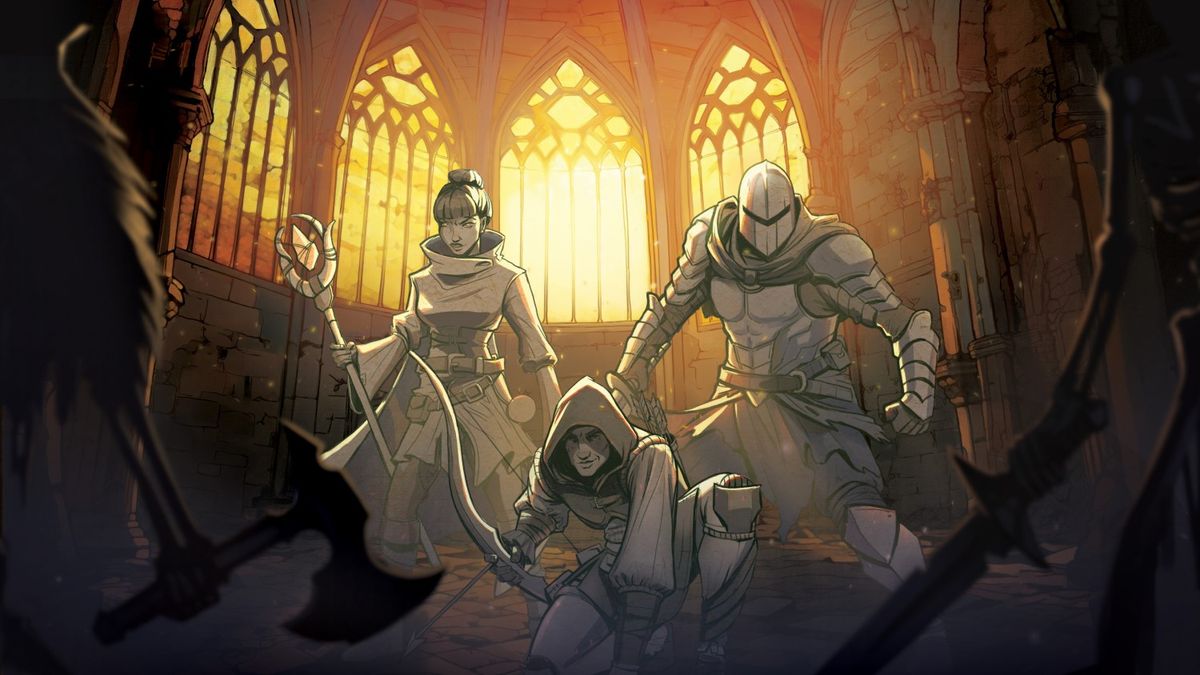Civilization 7 feels extra like a sequence offshoot than a Civilization 6 sequel, taking the commemorated grand technique sequence in a special route from the previous two video games. Its most radical concepts actually provide an fascinating option to play Civilization, although as issues stand it would not really feel just like the greatest option to play. It is essentially the most streamlined and pared-back the sequence has been in a very long time, which actually helps with accessibility and pacing—significantly in multiplayer—however could depart some craving for the depth and mechanical range of its predecessors.
Have to know
What’s it? A 4X turn-based technique sport during which you information an empire by means of the course of human historical past.
Count on to pay: $70/£60
Developer: Firaxis Video games
Writer: 2K Video games
Steam Deck: Verified
Hyperlink: Official website
Based within the pre-SVGA age of gaming antiquity, Civilization’s randomised but celebratory tackle human historical past has stood the check of time. Over three a long time on, you’ll be able to nonetheless put me down in entrance of any of the video games within the sequence and I’ll spend half my waking hours for every week straight guiding my individuals by means of the ages through struggle, diplomacy, exploration, culture-bombing, and plonking down World Wonders earlier than my rivals.
Over its first a number of entries, the sequence quickly developed to raised encapsulate the vibrancy and insanity of human historical past in a turn-based technique format. However in newer outings, it is grow to be extra about rejigging relatively than revolutionising that cavemen-to-cosmos saga.
-
Some 20 hours in, I can say that Civilization 7’s age transitions are the sequence’ most radical and disruptive mechanic but
-
Civilization 7 stay launch protection: critiques, ideas, and the most recent information
Sure, Civilization 5 de-stacked items made warfare extra tactical, whereas Civ 6 unfold cities throughout a number of tiles to permit for extra targeted, considerate metropolis administration. However in areas like diplomacy, faith, and warfare, modifications have provided alternative routes to make enjoyable these phenomena of human historical past relatively than pursuing some aim of ‘The Final Civ Expertise’. That is mirrored in the truth that each Civilization 5 and 6 get pleasure from enormous participant numbers to this present day; 5 is tight and balanced, 6 is huge, daring, and systems-heavy, each are sensible.
Most of the design selections in Civilization 7 seem like within the identify of brevity and pacing, with fairly a number of main methods trimmed within the course of. It’s nonetheless Civilization, and can nonetheless depart you snapping out of it questioning the place the previous couple of hours went, however sequence followers be warned: issues are completely different now.
New age
Let’s start with the broad strokes, and the boldest concept that Civ 7 introduces: Age transitions. Leaders and civilisations have now been separated: you retain the identical chief all through a sport, however your civ will change. Every sport is cut up into three Ages—Antiquity, Exploration, Trendy—and every time you progress into a brand new one, time skips a number of hundred years, and also you decide from one in all a bunch of recent civs to steer, particular to that period. So chances are you’ll begin with Egypt in Antiquity, then transfer onto Normans within the Exploration Age, earlier than touchdown on the great ol’ US of A to see you thru the Trendy Period. Every civ has some distinctive items, bonuses, and a devoted civic tree with particular insurance policies, a few of which you’ll carry over into the following period’s civ as ‘Traditions.’

There is a trace of the roguelike about it, as your foot-up within the subsequent period is constructed in your efforts of the earlier one.
That age transition is, by design, removed from seamless. As you close to the tip of an Age, which all civs collectively attain by making progress down 4 linear Legacy Paths, the world will face some type of disaster, similar to plague or barbarian invasions. As soon as the disaster reaches its head, the present iteration of your civilisation collapses, and also you decide a brand new one to construct over its foundations.
Constructing on the Golden/Darkish Age system launched within the Civ 6 Rise and Fall DLC, your achievements of the earlier period unlock boons for the following one. These achievements are acquired by means of 4 linear Legacy Paths—Financial, Cultural, Army, and Science—which reset at first of every Age, with new objectives related to that age. The extra milestones you attain in every Legacy Path, the extra Legacy Factors you need to spend on particular boons at first of the following period, till you attain the Trendy Age, the place every Legacy Path results in a victory situation. There is a trace of the roguelike about it, as your foot-up within the subsequent period is constructed in your efforts of the earlier one, whereas additionally setting you again to one thing of a brand new starting.

We have put Civ 7 by means of its paces, throughout eight completely different methods, from outdated gaming PCs, to handhelds, laptops, and high-performance fashionable rigs, and this is Nick’s in-depth Civilization 7 PC efficiency evaluation.
From a pacing perspective, this works wonders, as a result of on the level in earlier video games the place issues would begin getting a bit stodgy by way of unit muddle, metropolis micromanagement, and dropping gamers mainly being out of the victory race by the halfway level, Civ 7 speeds issues up and narrows the hole between the haves and have-nots. The Legacy Path victory situations embrace some fairly attainable ones, similar to digging up artefacts for the Tradition path, or industrialising your nation with railways and factories for the Financial one, and it isn’t unthinkable that gamers who have been flagging for a lot of the sport to drag a smash-and-grab victory out of the bag. It actually retains issues extra suspenseful proper as much as the tip.
Issues of modernity
Every period ushers in new sport methods. As an example, faith solely will get launched within the Exploration Age, as does the idea of ‘Distant Lands’, which unlocks new luxurious assets you could return to your homeland through treasure fleets (the settlement of Distant Lands can also be on the coronary heart of the Army Legacy Path for this age).
By the Trendy Age, the perform and yields of luxuries from the Exploration Age modifications, as they’re now not unique luxuries however widespread commodities that may be slotted into factories for greater bonuses. Within the fashionable age additionally, the ideologies of fascism, democracy, and communism come into play, every with their very own civic bushes and results on relations with different civs. That is all good things, making every period really feel considerably self-contained and outlined by distinctive objectives and mechanics. It does imply that such joyful eventualities as phalanx spearmen resolutely poking at tanks, or cavemen smacking helicopters out of the sky with golf equipment are actually gone, however if you would like that, then you definately’re spoiled for alternative with the previous six video games.

The comfortable resets and feature-drip of the Age system does so much to maintain the sport recent, however the Trendy Age nonetheless feels weakest. Flip instances do not drag as a lot as in earlier video games due to good touches like the flexibility to stack navy items into Commanders, and to immediately transfer troops between cities which have railway stations, nevertheless it lacks the main target of the ages that precede it. It is a disgrace that Firaxis minimize the World Congress from this outing—which allowed civs to vote on resolutions, world insurance policies, and have interaction in diplomatic skulduggery like banning pearls to undermine the civs that rely upon them—as a result of it might’ve been the right factor to boost the late sport.
Getting resourceful
Civ’s age-old system of citizen administration, whereby you would manually assign a metropolis’s inhabitants to work particular tiles as a manner of adjusting a metropolis’s focus, has been changed by slottable assets. So when you’ve simply constructed a city, you’ll be able to ship it loads of grub to speed up development, or ship some gypsum over to a brand new distant land metropolis that’ll give it a pleasant huge manufacturing enhance. In my comparatively quick time with the sport to this point, I’ve even managed to seek out some soiled little methods with resource-slotting, like including a number of camels to a metropolis to extend its useful resource capability, then constructing the Tomb of Askia Surprise to grant it additional gold and manufacturing for every useful resource in that metropolis; I am certain savvier Civvers than myself will discover loads of methods to meta the hell out of this new system.
The thought of distributing assets all through your empire to the place they’re most wanted is a wise one, however by the late sport I had gotten a bit fatigued with the useful resource display, which winds up containing dozens of little useful resource icons to manually micromanage. Additionally, you’ll be able to solely chop-and-change useful resource distribution in cities once you purchase new assets, so that you now not get these nail-biting rushes to finish a Surprise earlier than your rivals, the place you’d quickly ship a metropolis into manufacturing overdrive, speed-build some logging camps, and deforest the encircling space to generate as a lot manufacturing as rapidly as doable.

Somewhat too usually, nonetheless, Civ 7’s fat-trimming cuts into the lean a part of the meat as properly, dropping some richness and flavour within the course of.
Cities are actually divided into city districts (which may accommodate two buildings every) and rural ones. Which means you may have a bit extra fluidity about the way you wish to specialise a metropolis, if in any respect. In actual fact, the flexibility to construct over the earlier age’s buildings nearly beckons you to shift a metropolis’s manufacturing focus throughout eras. As an example, a metropolis that you just based in Antiquity as a navy border stronghold won’t have that very same function a thousand years later as soon as your borders have expanded, so why not flip it right into a profitable financial hub for the Exploration Age?
Staff, or Builders, who have been beforehand used to enhance empty tiles round your empire, have been performed away with altogether, victims to automation. As a substitute, every time a metropolis grows you get to immediately improve one tile in its neighborhood with rural enhancements like mines, farms, and plantations. And whereas I miss sure builder actions just like the aforementioned forest clearances for quick-and-dirty manufacturing boosts, on steadiness it is a smart minimize, decreasing unit muddle whereas retaining a key side of metropolis enchancment.
Worldwide relations
Somewhat too usually, nonetheless, Civ 7’s fat-trimming cuts into the lean a part of the meat as properly, dropping some richness and flavour within the course of. Diplomacy, for example, feels very skinny, and interactions with different leaders somewhat too transactional. The place earlier than they’d come voicing their opinions on sure actions of yours, share little aphorisms, partake in gossip, or ask you to maneuver your armies away from their borders, they now primarily come to you with gives for generic repeatable agreements.
This iteration of Civilization can also be weirdly, properly, civil.
They’re so much much less sassy this time spherical, and due to this fact much less characterful (and perhaps that is simply film-studies-graduate-over-analytical wankery effervescent up, however the truth that they’re now not searching from the display at you, however side-on on the chief you picked, makes me really feel a bit indifferent from these interactions, like I am the translator at their assembly relatively than a pacesetter).
Gone is also the freewheeling bargaining system the place you would demand, say, a metropolis, 5 gold per flip, and a sheep, from enemies in trade for peace. For a begin, assets are actually mechanically acquired from different civs once you set up commerce routes, so you’ll be able to’t lord over different civs by hogging or demanding extortionate costs for priceless assets that they need. The one bargaining chips in peace treaties are cities, which the AI appears all too keen to present away; there was one level the place an alliance I had meant that I used to be technically at struggle with somebody manner on the opposite facet of the world, and regardless of having not as soon as encountered them in battle, they provided me one in all their cities in trade for peace. Clearly, I stated sure, nevertheless it was weird.

Austerity measures
This iteration of Civilization can also be weirdly, properly, civil. Metropolis-States and barbarians from earlier video games have been rolled into Impartial Powers—some begin off hostile and successfully act as barbarians, however all may be befriended by spending sufficient Affect (a brand new forex used for each diplomatic interplay). When you begin the befriending course of, you are mainly assured to grow to be their suzerain for the remainder of the age except they get worn out.
There aren’t any extra city-state quests, and no extra tussling amongst civs for the assist of those small however essential powers through envoys or outright bribery. It relegates what was as soon as an fascinating and sneaky option to acquire diplomatic leverage to, successfully, the only click on of a button. Espionage has obtained comparable therapy, decreasing its scope to a number of pretty low-impact actions, similar to Steal Expertise, Hinder Army Manufacturing, and Hinder Analysis, that you just spend Affect to hold out. No extra sabotaging Surprise manufacturing, spy networks, or—Civ 4, how I miss thee—feeling such as you’re working your personal MI5-style spy company.

Religions and governments have additionally confronted extreme cuts. Faith someway manages to really feel each unrewarding and frustratingly hands-on to truly play, and easily entails sending missionaries to transform different cities (which you need to do on each an city and rural tile if that metropolis already has a faith). Transformed cities now not passively unfold faith, there aren’t any non secular diplomatic results, neither is there any of that wild non secular fight that noticed inquisitors hanging missionaries down with divine lightning in Civ 6. Seeing as faith performed a significant half in every sequence sport courting again to Civilization 4, it is disappointing that over 20 years on it has been diminished to one thing so superfluous.
As for governments, you might be locked into selecting one per period, and all it does exterior of minor diplomatic sway is have an effect on what your alternative of boosts for a bunch of turns is every time your civ enters a interval of Celebration (achieved by accruing Happiness). Decreasing, say, Theocracy to the occasional binary alternative between a brief Tradition enhance or manufacturing enhance for 10 turns simply would not really feel like a considerable reflection of that authorities sort’s affect on a nation. Like faith, it seems like a backwards step for the sequence within the identify of streamlining.
A looming legacy
To be clear, most of Civ 7’s shortcomings are relative to the 2 very fleshed out and nonetheless in style video games previous it within the sequence, which for me nonetheless stay on the head of the style. I nonetheless misplaced monitor of time and actuality enjoying it, and there are some fairly clear enhancements right here. Video games tick alongside at a extra even tempo due to some intelligent methods of addressing unit muddle, and struggle feels nice (even when the AI cannot totally deal with its tactical complexity). Newly navigable rivers have authentic strategic worth too, and I’ve had some nice instances sending dreadnoughts upriver deep into enemy civ territory to successfully bombard them from inside.

Civilization 7 seems like a response to the maximalism of its predecessor: sleeker and speedier, colder and fewer complicated.
I am additionally blissful to see the artwork type construct on the extra grounded one in all Civ 5 relatively than the divisive cartoon stylings of Civ 6 (one thing about dropping nukes on cities that regarded like they have been made out of gingerbread by no means sat proper with me). Talking of presentation although, the UI is not nice; it usually requires one too many clicks to get the main points you need, there isn’t any shortcut key to scroll by means of items, nor a option to get an summary of all of your items on the map. The place comparable video games use nested menus and textual content highlighting to present you fast data about key ideas, in Civ 7 I would have to go and kind issues into the Civilopedia to get fundamental data on issues like constructing results or unit fight bonuses.
Civilization 7 seems like a response to the maximalism of its predecessor: sleeker and speedier, colder and fewer complicated. Being the primary sport within the sequence to return out on consoles similtaneously PC, I can not assist however really feel that among the complexity cutbacks are made with gamepad gamers in thoughts. A few of these cuts are optimistic, they usually assist the sport stream higher (particularly, I think about, in multiplayer), however the simplification of methods like faith, diplomacy, city-states, and espionage implies that the journey by means of historical past would not really feel fairly as wealthy or rewarding.
It is as if Civ’s gone by means of its personal age transition—a number of steps ahead, a number of steps again. Whereas it is addressed some longstanding points, there’s somewhat an excessive amount of that is been stripped away for veterans like myself to name this significant progress on the legendary sequence’ Legacy Path.
The Verdict
76
Learn our evaluate coverage
Civilization 7
Nonetheless a compelling dash by means of human historical past, Civilization 7 sheds somewhat an excessive amount of weight to match its glorious predecessors.
Robert Zak
Robert is a contract author and persistent sport tinkerer who spends many hours modding video games then not enjoying them, and hiding behind doorways with a shotgun in Hunt: Showdown. Needs to spend his dying moments on Earth scrolling by means of his video games library on a TV-friendly frontend that unifies all PC sport launchers.





